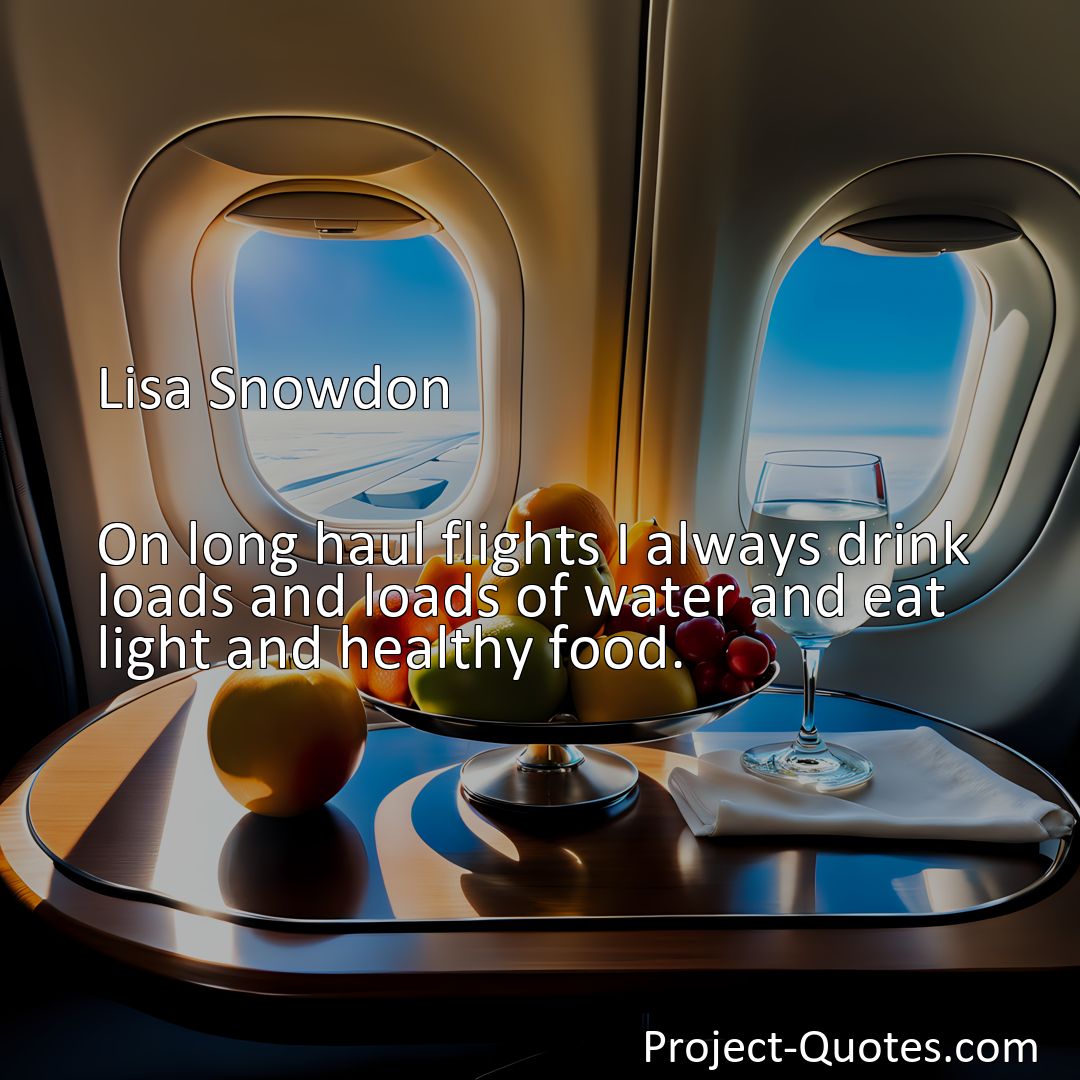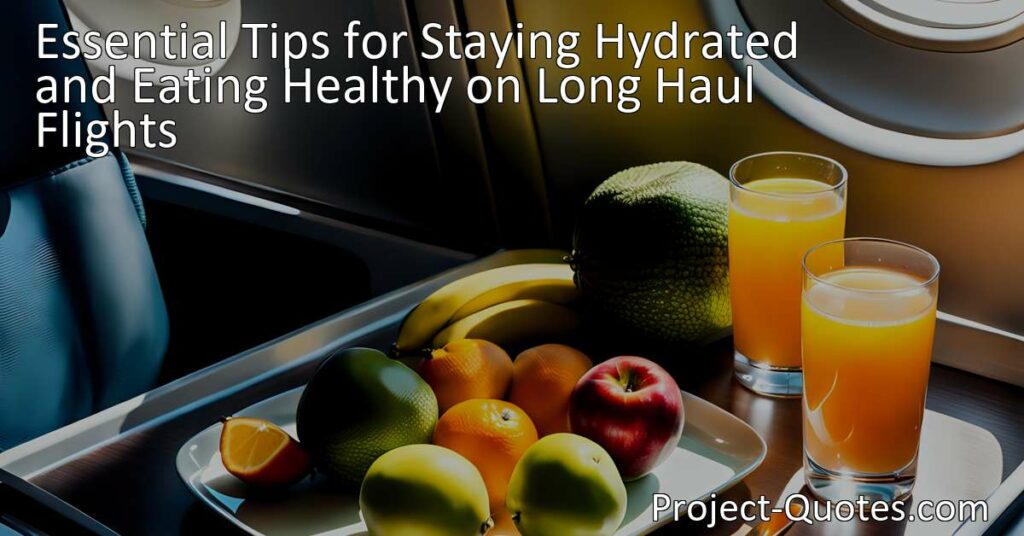On long haul flights I always drink loads and loads of water and eat light and healthy food.
Lisa Snowdon
Stay hydrated and nourished during long-haul flights by drinking plenty of water and opting for light, healthy food choices. Hydration is crucial to counteract the effects of dehydration, caused by the low humidity levels in the cabin, while nutritious food provides energy and prevents discomfort. Plan ahead, pack a refillable water bottle, prioritize meals with high water content, and avoid excessive alcohol and caffeine consumption for a more pleasant and revitalizing journey.
Table of Contents
Meaning of Quote – On long haul flights I always drink loads and loads of water and eat light and healthy food.
Staying hydrated and nourished during long flights is crucial for your comfort and overall well-being. With the quote “On long haul flights I always drink loads and loads of water and eat light and healthy food,” it becomes evident that the speaker recognizes the importance of making wise food and drink choices to ensure a pleasant journey. In this article, we will delve into the reasons why hydration and a nutritious diet matter during long flights, discuss some tips on how to achieve this, and explore specific food and beverage options that are both satisfying and beneficial for your body.
Long-haul flights can be physically demanding and mentally draining, mainly due to the extended periods of sitting, exposure to dry cabin air, and the overall disruptions to our usual daily routines. Thus, prioritizing hydration becomes vital to counteract the effects of dehydration that may arise during air travel. Water intake plays a crucial role in maintaining the body’s fluid balance, aiding digestion, regulating body temperature, and promoting skin health. When flying, the cabin’s low humidity levels, typically around 20%, are significantly lower than the optimal range of 30-65%. This dry environment can lead to moisture loss through increased perspiration and evaporation, potentially causing discomfort, such as dry eyes, dry throat, and even headaches. By drinking plenty of water before, during, and after the flight, you can combat these effects and keep your body functioning optimally.
While hydration remains a top priority, it is equally essential to pay attention to the quality of the food consumed during the flight. Opting for light and healthy food choices is beneficial for several reasons. Firstly, heavy, greasy meals can make you feel sluggish, bloated, and contribute to an upset stomach. On the other hand, lighter meals are easier to digest and less likely to cause discomfort or digestion issues, allowing you to feel more relaxed and at ease during the flight. Additionally, wholesome and nutritious foods provide the necessary energy and nutrients to keep you going throughout the journey. Unhealthy snacks or fast food options, high in salt, sugar, and unhealthy fats, can exacerbate feelings of fatigue and contribute to an overall sense of unwellness. By selecting healthier alternatives, you can enhance your physical vitality and mental clarity, allowing you to arrive at your destination feeling refreshed and ready to enjoy your travels.
Now that we have established the importance of consuming sufficient water and opting for light and healthy food choices during long flights, let’s explore some strategies for achieving this goal. Planning ahead is key when it comes to maintaining an appropriate diet while traveling. Prior to your flight, consider packing a refillable water bottle that you can easily fill up before boarding. Staying hydrated onboard can be a challenge, as beverages are often provided in moderation. By having your own water bottle, you can ensure a constant supply of water throughout the journey. Remember to inform the cabin crew that you have your own bottle, as they may need to make arrangements for refilling it. It’s also important to note that consuming excessive amounts of water can result in frequent bathroom visits; therefore, it’s essential to strike a balance that suits your body’s needs.
Besides staying hydrated, planning your meals and snacks can help you maintain a light and healthy eating routine. Most airlines offer meal choices in advance, giving passengers an opportunity to request vegetarian, gluten-free, or other dietary restrictions. Taking advantage of this service can ensure that you receive a meal that aligns with your preferences and dietary needs. However, if such options are not available or are not to your liking, packing your own snacks can be a great alternative. Some healthier snack options that are easy to pack and consume on the plane may include fresh fruit, nuts and seeds, granola bars, or even pre-cut vegetables. These snacks can provide essential vitamins, fiber, and healthy fats, keeping your energy levels stable throughout the flight.
When deciding on your in-flight meals, it’s important to remember that specific choices can aid in promoting hydration and overall health. Choosing foods that have a high water content, such as cucumber, watermelon, oranges, or grapes, can contribute to your hydration goals while satisfying your taste buds. Foods that are rich in essential nutrients like vitamins, minerals, and antioxidants should also be prioritized. Options such as salads with a variety of colorful vegetables, grilled chicken or fish, or whole grain sandwiches can provide a balance of macronutrients and essential micronutrients. Avoiding heavy sauces or dressings will ensure the meals remain light while still being enjoyable.
In addition to water and nutritious food choices, it’s worth mentioning the importance of avoiding excessive alcohol and caffeine consumption during flights. While it might be tempting to indulge in a glass of wine or a cup of coffee to relax or combat jet lag, both alcohol and caffeine can contribute to dehydration and disrupt your sleep patterns. Instead, consider herbal teas or infusions as alternative hot beverages, as they can be soothing and hydrating without the drawbacks of caffeine or alcohol. Prioritizing natural hydration methods will help you arrive at your destination feeling more alert and well-rested.
In conclusion, paying attention to hydration and making light and healthy food choices during long-haul flights is essential for maintaining comfort and overall well-being. By drinking plenty of water and opting for nutritious, easily digestible foods, you can combat the effects of dehydration, discomfort, and fatigue often associated with air travel. Planning ahead, carrying a refillable water bottle, and packing snacks that align with your preferences and dietary needs are practical strategies to ensure that you have nourishing options available during the flight. Remember to prioritize foods with high water content and essential nutrients, and avoid excessive alcohol and caffeine consumption. By incorporating these practices into your travel routine, you can make your long-haul flights more enjoyable, arrive at your destination feeling refreshed, and embark on your adventures with energy and enthusiasm.
Freely Shareable Quote Image
I hope this quote inspired image brings you hope and peace. Share it with someone who needs it today!


